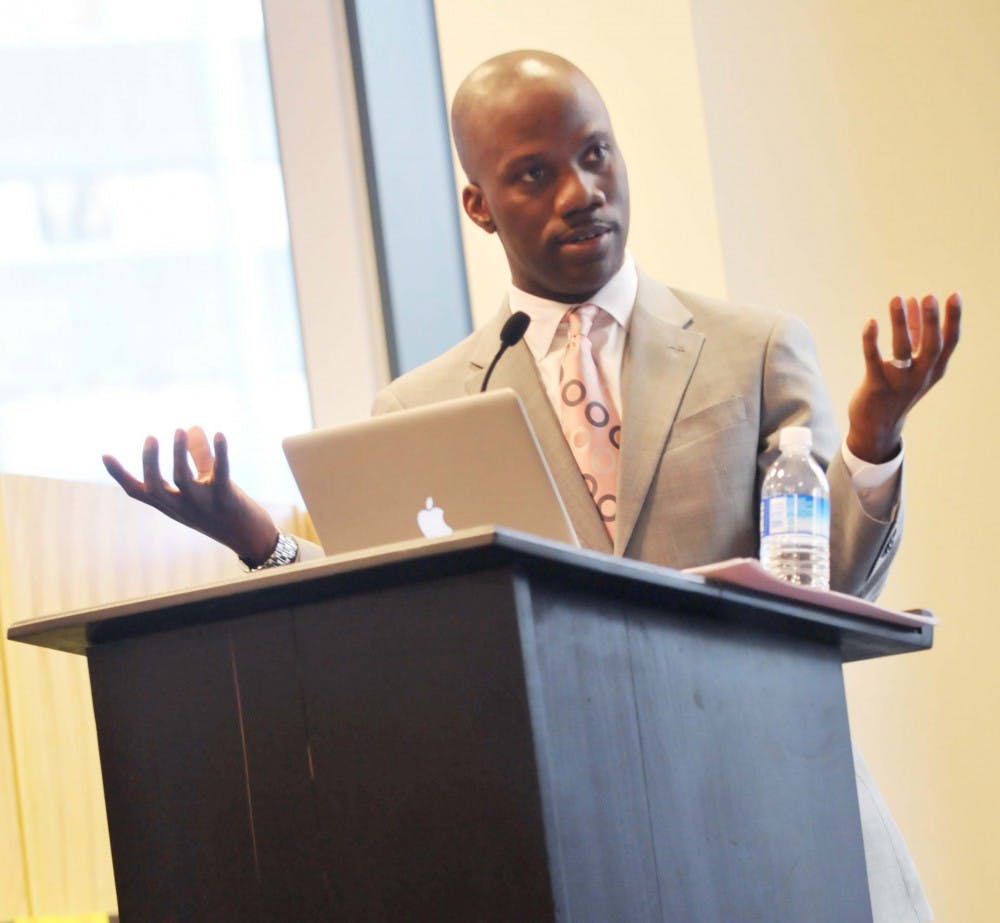
Graduate School of Education professor Shaun Harper wants to know what makes black and Latino males succeed in school, not what makes them fail.
Harper, who is also director of the Center for the Study of Race and Equity in Education, researched the factors that allow black and Latino men to succeed in his recent report, “Succeeding in the City.” Some of these factors include reinforcement of college-going culture, family values of education and avoiding neighborhood danger.
“The purpose behind the report is to counter the existing narrative on this demographic,” said Nathan Castillo, a Graduate School of Education doctoral student involved with the research. “We need to stop promoting the negative … stereotype that these young learners aren’t motivated … and that they don’t care about education, because what we saw was the exact opposite of that.”
He conducted his research at 40 New York City public high schools that were categorized as part of the Expanded Success Initiative, a component of the city’s Young Men’s Initiative aimed at increasing the graduation rate and advancement of black and Latino men.
Related: School of Education releases report on black male college success
The research team was composed of Harper, a postdoctoral student and 11 graduate students. They traveled to New York every Thursday to conduct a total of 415 personal interviews with young men of color.
Like the young black and Latino men in the study, who face negative stereotypes about their performance in school, every member of the research team has also faced adversity while growing up.
“We all come from diverse backgrounds where we had to overcome some instances of breaking through negative stereotypes of ourselves,” Castillo said. This diversity in the research team added to the “richness” of the data and also allowed the subjects to connect with researchers on a more personal level, he added.
Castillo and Keon McGuire, another GSE doctoral candidate involved in the study, both had experiences where they were told that they were not likely to be accepted into the college of their choice, or even that college was not a possibility. “When young men get these messages repeated to them over and over, that they’re not successful and that they won’t amount to anything … then they start to believe that,” Castillo said.
Related: Professor awarded for race research
The report emphasized the role of family when it comes to the value of education. According to the report, many students and their families consider school as “the way out” of their socioeconomic condition and the cycle of dropping out in their family.
Using education as a pathway, families often try to get their children into the best schools. GSE doctoral candidate and researcher Collin Williams, who was the first person in his family to graduate from college, said his parents moved to the United States from the Caribbean because they wanted to provide him with a good education.
“I was very much in and out of schools trying to find the best public schools to get the best education I could,” Williams said. “If that meant transferring every year or two years, then that’s what was done.”
Similarly, Castillo switched into a better private high school, even though he had to work an outside job to help pay the tuition. Like many of the Latino and black high school males in the study, Castillo came from a low-income background.
Related: Documentary sparks conversation about low-income students
McGuire had a similar experience. Growing up in a single-parent household for the first eight years of his life, he could remember earning extra money for his family as early as the sixth grade by delivering phone books.
What kept Castillo and McGuire going was their perseverance and the motivation and support they received from their families and schools. Castillo explained that “taking ownership of [his] own academic plan and success” allowed him to push himself beyond his limits.
Castillo’s experience echoes those of the young men in the study. Their families, teachers and counselors expressed high expectations for them and according to the report, “rarely failed to acknowledge their potential for greatness.”
By creating and reinforcing a college-going culture, schools and community members can push students to learn and achieve, McGuire said of the study results.
Related: University City High School student aims for scholarship
The researchers want to publicize their results to community members and teachers at schools in areas with black and Latino high school students. They want to keep “maintaing that dialogue” so that students will know they can overcome their obstacles, Castillo said.
The Daily Pennsylvanian is an independent, student-run newspaper. Please consider making a donation to support the coverage that shapes the University. Your generosity ensures a future of strong journalism at Penn.
DonatePlease note All comments are eligible for publication in The Daily Pennsylvanian.








